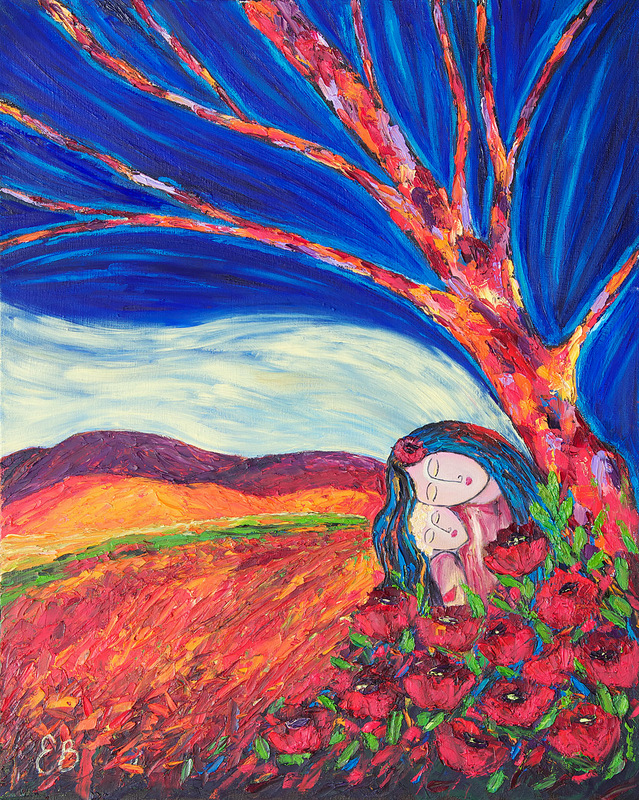I have three children. April is my oldest daughter. A delicate figure, feet barely touching the floor as she moves, she resembles Tinker Bell. But April is deceivingly tough — like nails. When she rides her horse she transforms into an amazone, galloping through the fields wild and untamed. Her younger sister, Hazel, is a “real” princess. She prefers to stand in front of a mirror admiring her pink tutu and her flexibility. Hazel thinks she is great. Hazel thinks everyone else is great, too, and she expresses her fondness by greeting all who cross her path, generously handing out more than a few kisses. April and Hazel are Olav’s big sisters. They love to tease Olav then smother him with love and affection. April and Hazel have Down syndrome. Olav does not.
While no one will deny that people with Down syndrome are individuals, just like people without Down syndrome, when it comes to prenatal screening and diagnosis, they suddenly belong to a group. Parents who have just received news that their unborn baby has DS are handed collective statistics and predictions as “neutral” information. Suddenly, it seems crucial that these parents are made aware of the average life expectancy for their child. They’re also informed of the likelihood their child will develop a health condition, such as allergies or leukaemia, the chances their child will learn to read or swim or ride a bicycle, and the typical age their child will eat with a knife and fork. Simple dreams like “Will my daughter be handy like dad or adventurous like mom?” and “Will my son be best friends with his two-year-old brother?” are replaced with a much bigger question: “Down syndrome: Would you call this a life?”
I declined testing when expecting April and enjoyed a carefree pregnancy. Hazel was diagnosed with DS prenatally and although I worried I’d learned that this information, these statistics, are not neutral at all. Who can really predict if a child will develop a disease or, for that matter, get into an accident? Who knows if an infant will grow to be a bully, or a victim of one? Maybe the child will abuse drugs or spend too many hours staring at a screen.
Scientists believe that within a few years the entire genome of an unborn baby will be analyzed from a drop of blood from a pregnant women. Expectations of parenting perfect offspring will grow and so will the illusion that these perfect genes will reduce suffering. Yet life is full of opportunities to mess things up and full of more opportunities to make things right again. You can eat a bucket-full of ice cream or go for a jog. You can park at a handicapped space or help an elderly woman cross the street. You can expect perfection from others or love them for who they are. Health and happiness, I’ve learned, are not set in our genes.
If you asked April and Hazel what life is like (with Down syndrome), they would probably give you their undivided attention for a few moments. Hazel would likely start telling you about her friends in school, her little brother Olav, and her favourite foods and activities. The story might get increasingly hard to follow and probably end in laughter and a high five. April will gaze at you solemnly from behind her glasses. Searching her brain for the proper words to express her feelings, she will be pensive for a while as in meditation. You will start to notice her delicate features and the freckles on her cheeks and tiny nose. Then, as she wraps her small arms around your shoulders, a smile will radiate like a ray of sunshine from behind that earnest look.
My daughter’s lives are not defined by the presence of an extra chromosome. While the road to fluent speech, flawless writing, and coordinated bicycling is often filled with obstacles larger than Mount Everest, planting our flag on top makes it all the more worthwhile. Of course, like any kid, mine can drive a mother insane. Hazel can be stubborn as a mule and April can take an hour to get dressed. But they also have the ability to simply accept their flaws and those of others without judgment and to fully enjoy life. In my opinion, that makes my daughters perfect.
Parents often say nothing could have prepared them for their role as a mom or dad. Perhaps this holds an even greater truth for parents of children with special needs. But to describe parenting a child with DS through brochures and statistics is like trying to understand the weather by watching the Weather Channel. If you really want to feel the weather, you go outside where the wind is tugging your hair, the rain lashes your face, melting snow creeps inside your collar, and the sun warms your skin and bones.
If you really want to make sense of a prenatal diagnosis it might be a good idea to go outside and meet a family living with Down syndrome. Join them in daily activities, talk with them. You might find that limitless joy, hardship, worry, sleeplessness, celebration, and love cannot be pinned down by medical facts. You might indeed call this a life.


